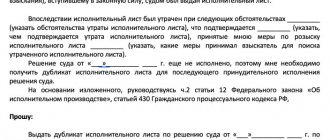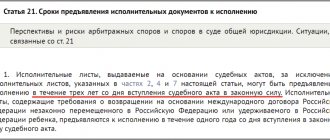Federal Law dated October 2, 2007 N 229-FZ “On Enforcement Proceedings” establishes that the fulfillment of the requirements contained in the writ of execution is entrusted to the Federal Bailiff Service and its territorial bodies. The direct execution of the requirements contained in the writs of execution is carried out by the bailiffs of the divisions of the territorial bodies of the FSSP of Russia.
As a general rule, writs of execution issued on the basis of court decisions can be presented by claimants for execution within three years from the date the court decision enters into legal force. The exception is executive documents for the collection of alimony, which can be presented for execution during the entire period for which they are awarded, as well as within three years after the end of the specified period.
An administrative claim is a reliable way to obtain evidence
In the case of S., the enforcement proceedings were completed by the bailiff of the Oktyabrsky ROSP of Saratov in November 2013. At the same time, the original writ of execution and the resolution on the completion of the enforcement proceedings gr. S. did not receive it.
In September 2021, we sent an application to ROSP with a request to provide a response on the progress of the enforcement proceedings and to issue an act in case of loss of the writ of execution.
As often happens (and the pandemic has nothing to do with it), the bailiff ignored our application.
Without waiting for an answer, we turned to the Oktyabrsky District Court of Saratov with an administrative claim to declare the bailiff’s inaction, expressed in the failure to provide a response to our application, illegal.
The administrative claim had the desired effect. At the very first court hearing, the bailiff prepared a response to our application, which stated:
“On November 30, 2013, the bailiff completed the enforcement proceedings in accordance with Art. 46 Federal Law “On Enforcement Proceedings”.
The original of the writ of execution and the resolution on the completion of enforcement proceedings were sent by registered mail to the address of the claimant: Saratov .... (note: the date of dispatch and the tracking number of the shipment were not indicated by the bailiff).
Due to the expiration of the storage period for the materials of the enforcement proceedings, the specified enforcement proceedings were destroyed, and therefore it is not possible to provide a copy of the materials, including copies of procedural documents, and the register of sending the enforcement document .”
A little earlier, I received information from the court that the materials of the civil case, on the basis of which the writ of execution was issued, were also destroyed after the expiration of the storage period (order of the Department of the Supreme Court of the Russian Federation No. 157 of December 28, 2005).
Liability for loss
Liability for loss is provided for FSSP employees, bank employees, officials of enterprises and legal entities. The mechanism for imposing a penalty is set out in most detail in the aforementioned Regulations of the FSSP, clause 5.15 of which provides for the imposition of a penalty based on the materials of an internal investigation. Disciplinary and material measures are applied to officials:
- reprimands;
- incomplete job compliance;
- dismissal from office.
Articles:
What to do if the writ of execution for alimony is lost
What is a writ of execution and what are the requirements for it?
Penalty for loss of writ of execution
The legislator has established differentiated liability for the loss of a judicial or other executive document:
- for individuals;
- officials;
- legal entities
The lowest fines are set for those who had the sheet in storage - from 1,500 to 2,000 rubles. Fines on officials for loss, in accordance with the Civil Procedure Code, cannot exceed 2,500 rubles, according to the Arbitration Procedure Code - 5,000 rubles. But, in addition to court fines, the perpetrators may be brought to administrative liability under Part 3 of Article 17.14 of the Code of Administrative Offenses of the Russian Federation, which provides for more severe fines: from 15,000 to 20,000 rubles. Judicial fines for guilty organizations can range from 50,000 to 100,000 rubles.
Judicial practice: First Cassation Court of General Jurisdiction and more.
Judicial practice should be uniform throughout the country. There cannot be any special - Ryazan or Ural - interpretations of the law
The positive practice of the 1st, 6th, 7th, 8th cassation courts of general jurisdiction had a significant role in shaping the position on the cases of S. and E., from which the following conclusions can be drawn:
- If the district department of the bailiff service sent a writ of execution to the claimant, but it is not possible to provide evidence of its receipt by the claimant to the court due to the destruction of documents of enforcement proceedings (including the register of postal items) after the expiration of the storage period for the materials , the courts satisfy the claimant's application to issue a duplicate of the writ of execution;
- In the case of destruction of civil case materials after the expiration of the storage period, this is not a basis for refusal to satisfy the claimant’s demands for the issuance of a duplicate writ of execution;
- In case of loss of the writ of execution due to the fault of the district department of the bailiff service, the courts satisfy the claimant's application to restore the deadline for submitting the writ of execution for collection ;
These conclusions are confirmed by judicial practice, in particular: Determination of the First Cassation Court of General Jurisdiction dated 04/03/2020 N 88-7561/2020 , Determination of the Sixth Cassation Court of General Jurisdiction dated 02/28/2020 N 88-2827/2020, Determination of the Seventh Cassation Court of General Jurisdiction dated 01/09/2020 N 88-141/2020, Ruling of the Eighth Court of Cassation of General Jurisdiction dated 05/22/2020 N 88-7632/2020, Ruling of the Eighth Court of Cassation of General Jurisdiction dated 03/06/2020 in case No. 88-4075/2020.
How to prove the loss of a writ of execution and obtain a duplicate of it
According to clause 1. Art. 323 of the Arbitration Procedure Code of the Russian Federation, at the request of the claimant, the arbitration court that adopted the judicial act may issue a duplicate of the writ of execution. An application for the issuance of a duplicate may be submitted before the expiration of the period established for presenting a writ of execution for execution (i.e. within 3 years from the date the decision enters into legal force), or if the writ of execution is lost by a bailiff or other the person carrying out the enforcement and the claimant became aware of this after the expiration of the period established for presenting the writ of execution for execution, within a month from the moment when the claimant became aware of the loss of the writ of execution.
When considering an application for the issuance of a duplicate writ of execution, the court ascertains the circumstances indicating the loss of the writ of execution and examines the evidence confirming its loss - paragraph 3 of Article 323 of the Arbitration Procedure Code of the Russian Federation.
Such evidence is a certificate from the SSP or another body about the loss of the writ of execution or documents confirming its loss during forwarding (for example, when sending mail there is an inventory of the shipment, but the recipient denies receipt or there is a certificate from the postal organization about the loss of this item). However, in the absence of such evidence, the courts also predominantly take the side of the claimant in cases where the application is filed within the established time frame and the writ of execution is not executed.
Thus, in case No. A53-12667/2009, the Arbitration Court of the North Caucasus District dated February 10, 2021 No. F08-9012/15, canceling the judicial acts of the arbitration court of the first and appellate instances on the refusal to issue a duplicate writ of execution, determined that the court must establish: the fact of loss of the writ of execution; compliance by the applicant with the deadline provided for in Part 2 of Article 323 of the Code; whether the judicial act has been executed.
Since the current legislation does not contain provisions according to which the fact of loss of a writ of execution is subject to proof by special means of proof, this fact can be confirmed by any evidence that meets the requirements of relevance and admissibility. The absence from the Treasury, where the writ of execution was presented for execution, of a covering letter on the return of the writ of execution to the Claimant, but if there is confirmation that it was received by him, is sufficient evidence of its loss.
No less interesting are the conclusions of the Federal Arbitration Court of the Northwestern District in case No. A42-60/2008 (Resolution of January 23, 2012 No. F07-11113/08). As the court found, the Company, based on the results of an inventory of settlements with counterparties, revealed that the obligation of the Tax Inspectorate to pay interest to it was not fulfilled, the original writ of execution could not be found, and the sheet was lost. This circumstance was not identified earlier due to the fact that during the same period, penalties were made on the basis of writs of execution for similar disputes; the decisions in other arbitration cases were executed in full, and the Company erroneously considered the decision in this case to be executed; the opposite was established only during the inventory. The court considered the fact of the loss of the controversial writ of execution proven.
In case No. A10-1572/2012, the Federal Arbitration Court of the East Siberian District, by Decision of May 29, 2014 No. F02-2097/14, upheld the judicial act of the lower authorities on the issuance of a duplicate writ of execution in force on the basis of the memo submitted by the Claimant from the legal adviser addressed to the General director that the writ of execution was lost when moving to the new administrative building. To confirm the fact of the move, the Plaintiff provided permission to put the facility into operation. In turn, the territorial body of the FSSP provided information that enforcement proceedings on the controversial writ of execution were not initiated.
The Twelfth Arbitration Court of Appeal, by Resolution No. 12AP-8809/14 of September 25, 2014, canceled the refusal decision of the Arbitration Court of the first instance to issue a duplicate of the writ of execution, taking into account paragraph 5 of Article 10 of the Civil Code of the Russian Federation, according to which the good faith of participants in civil legal relations and reasonableness their actions are assumed . In the absence of evidence of the claimant's bad faith when filing an application for the issuance of a duplicate writ of execution, the court of first instance should have proceeded from the fact that the claimant had lost the writ of execution, since otherwise was not proven.
Thus, despite the condition of clause 3. Art. 323 of the Arbitration Procedure Code of the Russian Federation, in accordance with which, when considering an application for the issuance of a duplicate of a writ of execution, evidence confirming its loss must be examined , the courts proceed from the circumstances that, unless otherwise proven, the writ of execution is considered lost.
Even in the absence of direct evidence of the loss of the writ of execution, and if the debtor does not prove that the writ of execution has been executed and the application was filed outside the period established by law , the courts will satisfy the claims of the claimants to issue a duplicate of the writ of execution.
In case of loss of a writ of execution, it is advisable for claimants to apply to the arbitration court with an application for the issuance of a duplicate of the writ of execution in all cases of its loss, but within the period established by clause 1 of Art. 323 Arbitration Procedure Code of the Russian Federation.
The review was prepared by senior lawyer of the YURKOLLEGIA company Stanislav Lukshanov
Unlock access to the private part of Clerk with a Premium subscription. Get hundreds of webinars and online courses, unlimited consultations and other proprietary content for accountants.
Hurry up to subscribe with a 20% discount until October 15, 2021. Read more about “Premium” here.
What to do if you lose a leaf
When identifying the fact of loss of a writ of execution, you must be guided by the norms of the Code of Civil Procedure of the Russian Federation, Federal Law No. 229-FZ, Order of the FSSP dated September 28, 2015 No. 455. All necessary actions are described in the order of the FSSP “On approval of the Regulations on the organization of work to restore lost writ of execution, writ of execution proceedings or individual documents that were part of enforcement proceedings"
The claimant can apply to the court to obtain a duplicate, or demand it from the bailiff. To do this you need to do the following:
- apply for a personal appointment with the bailiff or submit a written request for the issuance of a certificate of loss of the sheet;
- send to the bailiff a request to restore the writ of execution by the FSSP;
- demand an internal investigation to establish the causes of the loss (if the head of the FSSP department did not conduct such an inspection himself).
This is important to know: Do bailiffs have the right to seize property?
If the bailiff himself discovered the fact of the loss or destruction of the sheet (for example, when accepting and transferring cases between employees), he is obliged to immediately notify the claimant about this. The notice explains the right to go to court to obtain a duplicate of the sheet, and also indicates a list of actions that the bailiff himself will perform to obtain a document to replace the lost one.
If you decide to go to court yourself, you need to fill out a written application and indicate the reasons for issuing a duplicate. If there is evidence of the direction or delivery of the sheet to the bailiffs, or an official certificate from the FSSP. There will be no problems when receiving a new document. There is no need to pay a state fee for issuing a duplicate if you confirm that the reasons for the loss of the original are valid.
If a bailiff goes to court, the claimant is brought in to consider the application by an interested party. If the lost document has already been recovered, the bailiff will restore the relevant information through the AIS of the FSSP of the Russian Federation (electronic database of all initiated proceedings).
Consequences of leaf loss
After the duplicate is issued, enforcement proceedings will continue according to the general rules. If the original copy is subsequently found in the files of the FSSP or another body, it will not be used. The issuance of a duplicate automatically invalidates the original document.
The following consequences may arise for the person guilty of losing the writ of execution:
- based on the results of the internal investigation, the bailiff will be subject to disciplinary action, up to and including dismissal;
- If a document issued by arbitration is lost, a fine will be imposed under Art. 331 Arbitration Procedure Code of the Russian Federation;
- if the lost document was issued by a magistrate or district court, penalties are imposed on the bailiff under Art. 431 Code of Civil Procedure of the Russian Federation.
If the head of the FSSP department refuses to conduct an investigation and hold his subordinate accountable, you can file a complaint addressed to a superior.
At the time of applying to the court for a duplicate, the deadline for presenting the sheet for execution may expire. In this case, you need to apply for an extension or restoration of this period, since you were deprived of receiving the debt due to the fault of FSSP officials.
Practicing lawyer: Dmitry Vasilievich Sharapov







